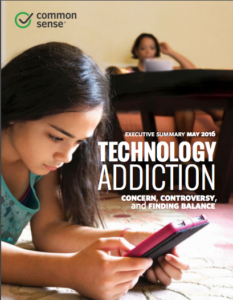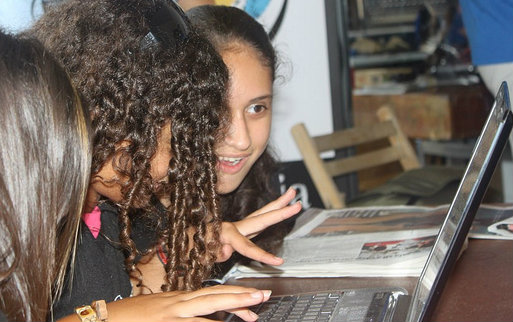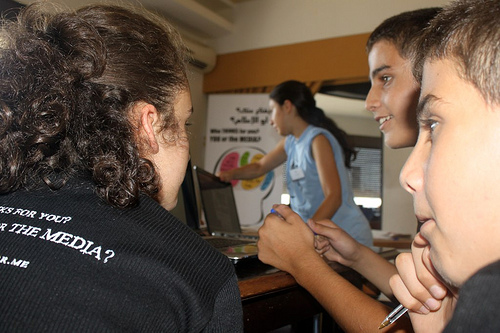Is Digital Literacy the Most Important Kid Skill?
Here’s a multiple-choice question for educators:
Young people today spend MOST of their time doing which of the following?
- Learning in school
- Sleeping
- Spending time with their families
- Engaged with their screens
If you answered “engaged with their screens,” then you were right! According to Common Sense Media, today’s teenagers (ages 13-18) spend an average of nine hours per day with their screens, and for tweens (ages 8-12) it’s six hours per day. (See the updated 2019 CSM study.)
This does not even take into consideration the time young people spend using digital technologies for school or homework. In another study, 50% of teens admit feeling “addicted to their devices.”

Sexting, cyberbullying, plagiarism, digital drama, predator dangers, and the like have become constant, much-discussed concerns. Many a school has found itself grappling with these new challenges of online life.
Schools try to cope
So how are schools preparing young people to navigate this brave new world where they spend most of their time, make many of their friends, and are exposed to an avalanche of new information?
That’s a good question. Some schools schedule occasional assemblies or lessons, inviting “experts” to coach students on online safety, focusing mostly on the dangers that exist online. Some schools include sporadic “digital citizenship” lessons (the safe and respectful use of digital tools), as their busy schedules allow. Other schools put students on computers with no preparatory lessons at all.
Each of these approaches misses the mark by completely overlooking the broad and complex landscape our youth have been thrust into. Our students need, and deserve, more. They need a broad education in “digital literacy.” Here’s why:
While online safety and digital citizenship lessons are a great way to begin preparing students to use digital tools ethically, thoughtfully, and competently, it’s an incomplete education…. rather like teaching them to drive by focusing only on accidents and how to change a flat tire. It overlooks the places they might go or how to make the most of the trip. What digital literacy does is take students on the journey from avoiding harms to capitalizing on opportunities.
Thankfully this approach is starting to take root. Many states throughout the U.S. are beginning to pass legislation mandating that these kinds of lessons be included in school curricula. For example, in California where I live, a bill by State Senator Bill Dodd (D-Napa) that seeks to teach students how to tell the difference between fake and real news recently passed the State Senate. According to Dodd,
While we already require critical thinking skills in our school, those skills haven’t kept up with the emerging technologies…By giving students the tools to analyze the media they consume, we can empower them to make informed decisions.”
Teaching students to analyze the media they consume
Last year I was one of a very few lucky teachers given an opportunity to teach regular “media literacy” lessons (the use of critical thinking skills to evaluate media messages) to 8th graders. Because my students had already received lessons in online safety, digital citizenship and “information literacy” (how to use the Internet for research), teaching them media literacy was like spreading icing on a well-baked cake.
During our weekly hour-long sessions, students learned (and practiced) how to be thoughtful consumers (and producers) of the myriad of media that comes courtesy of their devices. We explored media stereotypes, how photos might be doctored or “photoshopped,” and new ways of presenting online information.
My students learned strategies to detect fake news and misinformation online. These lessons were made more poignant because they already knew how, and why, the Internet serves them information that matches their likes and interests (often called “filter bubbles”… look it up!).
They learned about “sexting,” not only discovering the serious consequences of becoming involved as a sender or an unsuspecting recipient, but learning what to do should they or a friend become involved in such an incident. They learned (and practiced) how to blog and comment in respectful and productive ways.
These lessons had great impact because of the things students already knew, thanks to earlier lessons, about how all of these activities impact their digital reputations, for better or for worse.
The consequences of digital missteps can be severe
Serving media literacy upon a foundation of digital citizenship and information literacy helps students make sense of a complex environment in which everything they do, post, comment on, or are mentioned or tagged in is public, permanent, and can be copied, shared, and viewed by vast and sometimes invisible audiences.
The consequences of not fully understanding this fact are severe. As Alan Katzman, CEO and Founder of Social Assurity, an organization that helps young people make and maintain a positive online presence, says,
The many benefits of building a discoverable and reflective social media presence for college and career opportunities are just beginning to come into focus.”
For example, Harvard recently rescinded offers to 10 prospective students because of their inappropriate social media posts. This event shines a bright light on the stark fact that even these smart kids were digitally illiterate.
Digital literacy will continue to matter. Kaplan, one of the world’s largest and most diverse education providers, conducts an annual survey of college admissions officers in the U.S. and in its most recent one, released in February 2017, 35 per cent of the 350 officers surveyed said they check the social media profiles of applicants. What they find can either help or hurt a student’s chances of getting into the school, the respondents said.
My own students recognize the importance of the lessons they receive. Last year I overheard one student saying to another, “Isn’t it strange we have Algebra classes five days a week, and this class only once?”
“It doesn’t make sense,” the other student agreed. “I will use media much more than math.”
She is probably right. Judging by the direction we are already headed, media will continue to play a huge factor in the lives of our youth. Equipping them with skills to use it ethically, responsibly, thoughtfully and competently should be Job #1. We can no longer relegate this to assemblies, after-school clubs, or left-over class periods.
Cyber Civics
The school my own children attended (Journey School, a public charter school in Southern California) recognized this back in 2011. That’s when they gave me the green light to deliver lessons in digital literacy to middle school students. That experiment grew into what we now call Cyber Civics—a three-year series of weekly lessons in online safety, digital citizenship, information literacy, and media literacy…a complete education in “digital literacy.” Today Cyber Civics is taught by schools in 25 states, and internationally, and the program continues to grow. With any luck, schools everywhere will come to the realization that digital literacy is THE most important skill.
Feature image source
Diana Graber is founder of CyberWise.org and CyberCivics.com, two organizations dedicated to helping adults and youth learn digital literacy skills. A long-time media producer with an M.A. in Media Psychology & Social Change, Graber is also a Waldorf school parent and teacher. She is a regular contributor on digital media topics for The Huffington Post and other media. As Adjunct Professor of Media Psychology for the Massachusetts School of Professional Psychology (MSPP), she taught “Media Psychology for the 21st Century.”







































Diana, thank you for showing us the importance of Cyber Civics, and for your work in schools.
Thank you for your kind words Mary :)
The work you are doing is so important for so many reasons. As it relates to my field (child sexual abuse prevention), parents don’t realize the child’s screen is a window to the world, which can be good and bad. Predators know this, they know exactly where your kids hang out online and they know how to get them to move offline. Parents need to take digital literacy and cyber civics very seriously as if their kids’ life depends on it.
Thank you Christy. I totally agree, the only way to truly keep kids safe is to equip them with the skills to protect themselves in spaces where their parents rarely roam!